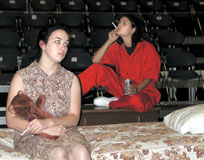Getting Out ‘connects’ with any audience

Rachel Mastin and Rachel Weisensee star in Southern´s first production of the semester, Getting Out, a story of a young woman being released from prison.
Memories are internalized as plays on the stages of people’s minds, giving shape to their regrets.
One such play is now being presented to audiences as the stage of one character’s mind is made visible in Southern Theatre’s current production, Getting Out. The play, by Marsha Norman, began its run Sept. 16 and will have its final performances Friday and Saturday at 7:30 p.m. in the Bud Walton Theatre.
The story follows a young woman’s struggle after being released from a prison where she has spent much of her life.
Dr. Jay Fields, play director, said it’s not what the play is about.
“The show is about the fact that all of us find ourselves in situations that we’d like to get out of,” Fields said. “It might be that you have a bad habit, maybe a drinking problem or a drug problem or you have a bad marriage or a bad relationship or a bad anything that you’d like to get out of and it’s about the difficulty of getting out of that bad situation.”
One thing Fields finds interesting about this play, which he partially chose for its strong female roles, is that there are two actresses playing the same character. Arlene, played by Rachel Mastin, junior theatre major, is the main character after she is released from prison. Arlie, played by Rachel Weisensee, senior theatre major, is the main character before she is released from prison. Arlie’s scenes are played as flashbacks in Arlene’s mind.
The two characters move in and out of each other’s worlds. Though the characters pass each other, they’re not really on the same plane.
“It’s very theatrical in that respect that you have people intermingling from different time periods on the same stage at the same time,” he said.
This intermingling is something Weisensee thinks will impact viewers.
“When you can see someone dealing with their past and it’s right in front of them being acted out I think it kind of brings to mind to let go of things you’re feeling guilty about and move on with your life,” Weisensee said.
Both Mastin and Weisensee had to undergo changes to play the same character. Mastin’s hair, which is naturally brown and curly, is now black and must be straightened before each show.
“I’m always up for change, so it wasn’t that big of a deal,” Mastin said. “It’s kind of weird to look in the mirror now. I scream every now and then.”
Though Mastin gives Weisensee a hard time, both of them had to go to Eyewitness Tattoo to get tattoos drawn on their arms with a Sharpe marker. Besides physical changes, the actresses spent time together to learn each other’s mannerisms.
“Rachel and I actually lived together for a month while rehearsals were going on because I couldn’t get back in on campus,” Mastin said.
The show contains coarse language and violence, which some actors were apprehensive about at first.
“You would expect these people to talk this way so it’s really not that bad once you see it,” Weisensee said. “Once I got over the initial difficulty of saying those words in front of my mother it wasn’t too bad.”
Despite the content possibly bothering some, Mastin thinks everyone can gain something from the play.
“Everyone can connect to this show in a way that is very, very, very personal because it deals with your past and everyone has done things in their past that they would like to forget and just can’t,” she said. “It’s a matter of embracing that and once you embrace what has been holding you back and what you have done in your past you can actually get out of the things that hold you back, and I think that’s what the play is about, actually getting out of everything that is holding you back.”
Tickets for each showing are free for students, $3 for adults and $1 for seniors.
Your donation will support the student journalists of Missouri Southern State University. Your contribution will allow us to purchase equipment and cover our annual website hosting costs.



























